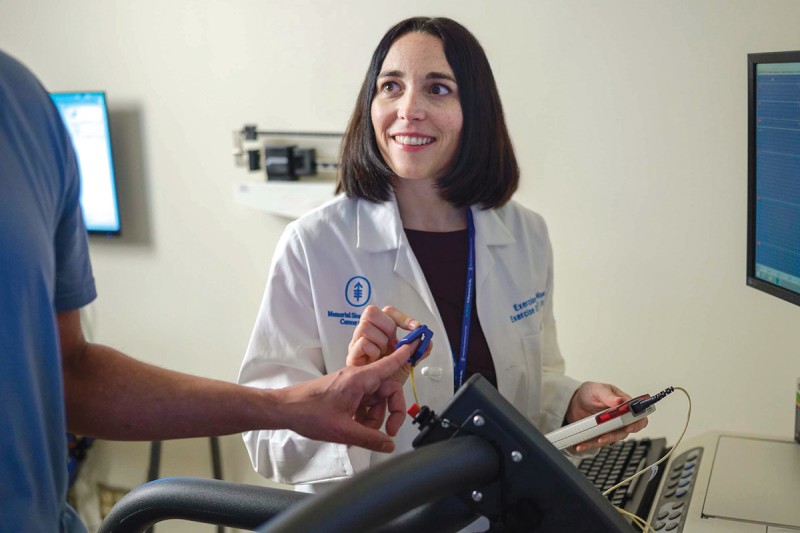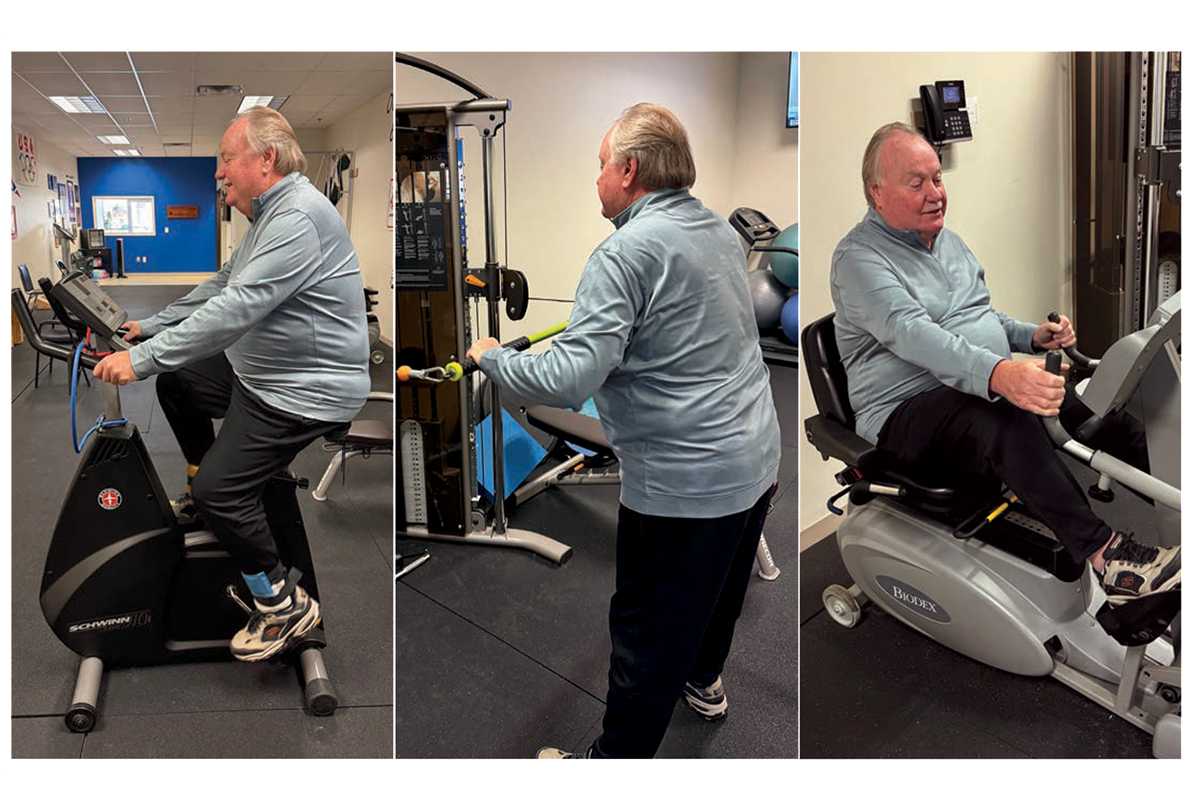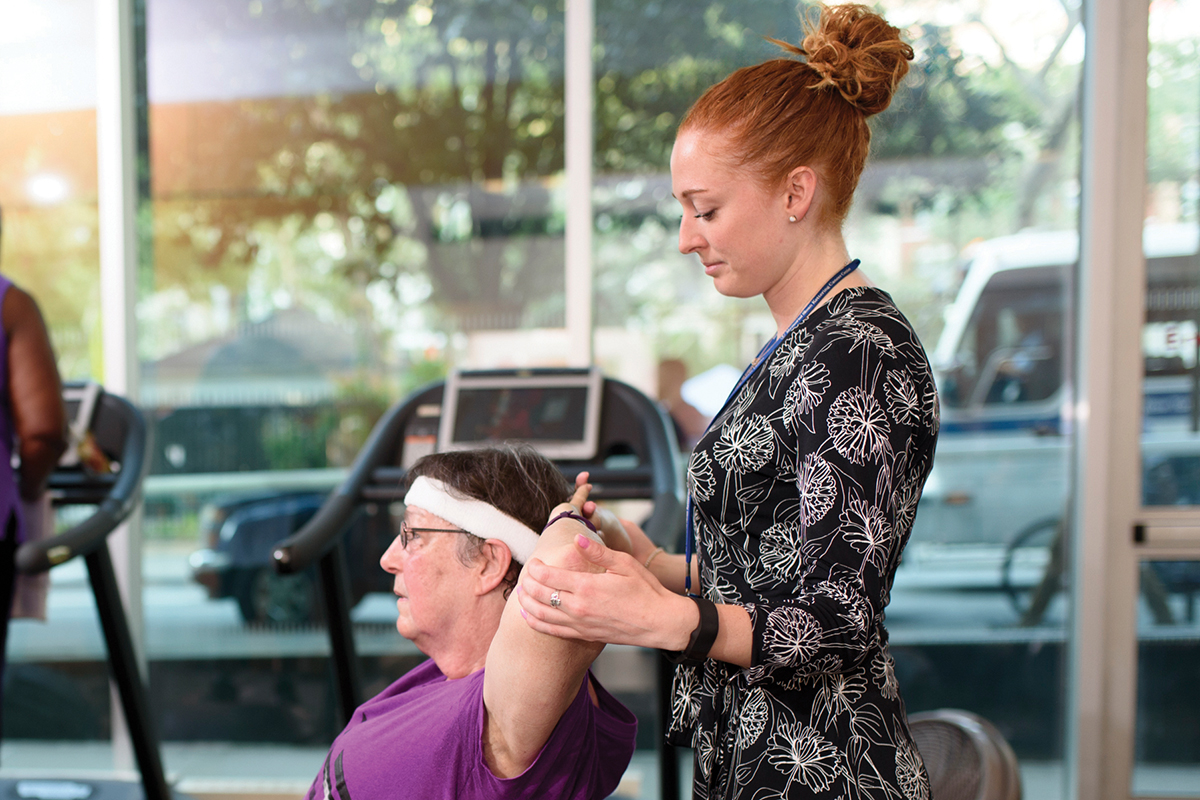
Dr. Jessica Scott researches how exercise can prevent the decline in fitness often caused by cancer treatments. It may even change the biology of the cancer itself.
Cancer patients may be surprised to learn they share something in common with astronauts in outer space.
It turns out that lying in bed and floating in zero gravity take a similar toll on the body, says Jessica Scott, PhD. She knows because she was a NASA scientist before joining the Exercise Oncology Program at Memorial Sloan Kettering Cancer Center (MSK).
“Astronauts have a lot of the same symptoms as cancer patients — being inactive and weightless can hurt fitness in a way similar to receiving a cancer treatment like chemotherapy,” Dr. Scott says. “Astronauts even get something called ‘space fog,’ which is similar to what people with cancer call ‘chemo brain.’”
When Dr. Scott saw how exercise can counteract the damage in space to the heart, brain, and muscles, she wanted to apply those lessons to benefit the millions of people with cancer. She came to MSK in 2017 to work with Lee Jones, PhD, who had established the Exercise Oncology Program.
“MSK is a leader in precision medicine, and that’s exactly what we are trying to apply to exercise — a type of precision medicine,” Dr. Scott says. The team conducts rigorous and innovative research investigating the effects of exercise to offset treatment side effects and to control cancer. They work closely with MSK’s Healthy Living Program.
Reducing the Toll of Cancer and Its Treatment
Contrary to popular belief, the best way for patients feeling depleted to recover is not necessarily to stay in bed.
“It’s now clear that exercise has major benefits for people being treated for cancer as well as for cancer survivors,” says MSK exercise physiologist Kylie Rowed. “In addition to improving physical and mental health, it can help minimize the long-term effects of cancer treatments such as chemotherapy and radiation.”

Dr. Scott was a NASA scientist before joining MSK.
The benefits can be dramatic. For example, MSK research showed that people who endure three months of chemotherapy had a 15% decline in fitness levels within three to six months of treatment — equal to a decade of aging. But exercising just three times a week significantly reduced that steep decline.
Recently, the Exercise Oncology Program has taken the research a step further, conducting studies that shed light on whether exercise can affect cancer survival and recurrence and help new cancer drug therapies work better.
There is even tantalizing evidence that exercise might change the biology of the cancer itself, slowing its growth.
A First-of-Its-Kind Clinical Trial
In July 2024, Dr. Jones’ team published results in JAMA Oncology from a groundbreaking clinical trial suggesting that specific amounts of exercise before surgery among men with early-stage prostate cancer can meaningfully improve two key biomarkers associated with better outcomes.
“To our knowledge, this is the first clinical trial to research the optimal amount of exercise therapy for people with any kind of cancer diagnosis,” Dr. Jones says.
Previous research, including MSK’s, had shown that exercise was associated with a lower risk of prostate cancer progressing, and that men who report exercising regularly have a lower risk of dying from the cancer. But as all scientists know, correlation is not causation.
The true test is “treating” patients with controlled amounts of exercise therapy prescribed in the same way drugs are tested and prescribed — in specific “doses” administered over specific periods.
Researchers wanted to know: What is the most exercise people could reasonably be expected to do? Does the exercise have any biological effect on the tumor itself? And perhaps most important: How much exercise is enough?
To find out, the researchers studied 53 men scheduled to undergo surgery for their prostate cancer at MSK. This allowed them to examine the tumor at two different points: when the tumor was biopsied at diagnosis and again at the time of surgery — usually about four weeks later. That provided a four-week window to test the effects of exercise alone, when none of the patients had undergone any treatments such as radiation or chemotherapy.
Participating in Research From Home
To make it as convenient as possible, the team found a way for most parts of the study to be done at home. They delivered a study kit that included a treadmill, an iPad loaded with apps, a smartwatch, a continuous glucose monitor, a blood pressure cuff, and a digital scale. All exercise sessions consisted of walking on a treadmill while being monitored via Zoom by an exercise physiologist. Each participant was assigned one of the following “doses” of exercise:
- 90 minutes per week
- 150 minutes per week
- 225 minutes per week
- 300 minutes per week
- 375 minutes per week
- 450 minutes per week
Robert Blumber was diagnosed in 2020 and scheduled for surgery several weeks later by urologic surgeon Vincent P. Laudone, MD.
“When they proposed the clinical trial to me, I thought it was a great idea, and my wife, who is a nurse, was eager for me to participate,” he says. “It took my mind off the upcoming surgery. I really benefited from focusing on my physical well-being and doing things like checking my blood pressure every day.”
He also enjoyed talking to other participants on the Zoom session. “There were three or four others who were on a similar schedule, and we kind of became friends during that time, despite never meeting in person.”

After his prostate cancer diagnosis, Robert Blumber took part in an MSK trial testing whether exercise could affect cancer-related biomarkers.
Biological Changes
The team measured two biomarkers associated with how well people did after a prostate cancer diagnosis: Ki-67 — a protein found only in cells that are dividing — and PSA, or prostate specific antigen, a well-established biomarker for prostate cancer risk and progression.
The results were eye-opening. After exercise, the biomarkers either decreased or remained stable. (Remember, the men were not receiving other treatment.) Interestingly, there seemed to be a sweet spot: Most of the benefit was achieved with 225 minutes (3 hours and 45 minutes) of exercise a week. More than that amount had no greater impact on biomarkers.
“This was a key finding because it challenges the notion that ‘more is always better’ when it comes to exercise,” Dr. Scott says.

Exercise physiologist Kylie Rowed says exercise can improve mental health and minimize effects of cancer treatments such as chemotherapy and radiation.
While encouraging, these results don’t prove exercise will improve someone’s cancer prognosis.
The researchers were looking only to see if exercise had an impact on the tumor, in the form of a biological signal over the short term. Determining if exercise leads to longer survival or better outcomes will require longer and larger clinical trials.
There is already a phase 2 clinical trial underway using the 225-minute dose level to better understand how exercise can impact prostate cancer progression. Similar trials are expected for other solid tumor cancers, including looking at whether cancers that have specific genetic mutations respond differently to exercise.
Establishing Exercise as Essential for Cancer Treatment and Prevention
“The hope is that people can be referred to an exercise physiologist who can give them a personalized prescription tailored to their physiology, tumor characteristics, and overall situation — much in the same way cancer drugs are personalized,” Dr. Scott says.
In the meantime, patients say exercising improves their overall well-being.
“I think the sense of control the exercise gave me was very important at a time when I was feeling somewhat helpless,” Robert says. “As a cancer patient, it was something 100% under my power that could help my recovery.”
Dr. Jones’ research is supported by the MSK donor community, including AKTIV Against Cancer.